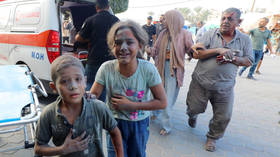Weaponizing the enemy’s children: Dehumanization of Palestinians has gone mainstream
A cynical explanation for why so many minors are dying in Israeli strikes on Gaza has been offered by a respected American outlet
The Economist has published a piece pretending to answer why Israel is killing so many Palestinian children, or, as the British journal puts it, why “children are a very high proportion of the victims of war in Gaza.” The authors note that “in Ukraine, a conflict between two much bigger powers, children account for fewer than 550 of roughly 9,800 civilian fatalities over a much longer period.” Hence, they venture, “Gaza’s enormous child death toll reflects, among other things, its especially youthful demography.”
Brazenly, the article removes the actual killers from the picture (the children fall victim to “the war,” not to the Israelis), gives just enough room to US President Joe Biden’s mendacious doubting of Palestinian victim figures (in reality certain to be under-counts) to make the reader wonder, and never mentions the true answer: so many children are getting killed because Israel commits one war crime after another against civilians, in pursuit of a strategy of collective punishment that amounts to genocide and ethnic cleansing (though these definitions, as is often the case with Israel’s actions, are being debated at various official levels). And also, because it can, due to the West’s complicity. In sum, an ordinary example of much Western mainstream coverage.
Yet there is more to this spin presented as cool, English-style level-headed analysis, complete with statistics and a chart. Inadvertently, the article opens a wide window on something ugly but important: The point where narratives about who has how many babies, or demography, meet the dehumanization that facilitates atrocities against fellow human beings.
As Khaled Elgindy, the director of the Middle East Institute’s Program on Palestine and Palestinian-Israeli Affairs, has explained in Newsweek, dehumanizing rhetoric conveys the idea that “the lives, suffering and humanity of Palestinians are less worthy than the lives, suffering and humanity of Israelis.” And as the genocide and Holocaust expert Raz Segal has found, the Israeli assault is a “textbook case” by the criteria of the 1948 UN Genocide Convention, while making others appear less than human is a typical element of genocide.
This devastating weapon of mass misrepresentation makes perpetrators, such as many Israelis now, feel willing to kill and righteous about the result. It also motivates and protects accomplices, many of them in the West’s political, media, and intellectual elites. For bystanders, those merely silent and passive in the face of the Palestinians’ desperate need for protection, dehumanizing language, which caricatures Palestinians as “animals” and “savages” and any calls for resistance as support for “terrorism” without nuance, at least suppresses empathy, numbs whatever is left of a conscience, and rationalizes flagrant moral failure.
The Economist is, of course, careful to (barely) maintain appearances by wrapping its nasty points in plenty of Sociologese about average income, fertility rates, and secondary education. But its message still comes through loud and clear: Gaza’s children are dying in droves not because Israelis are murdering them, but because there are so many of them. Dehumanization step one: Stop thinking of children as children, with names and faces; instead think of them as numbers. And on top of that, excessive numbers.
Step two of dehumanization: The fact that there are so many young Palestinians, in turn, is, we learn from The Economist, not a normal outcome of human life. By comparing Palestinians with even poorer populations in the world, the authors conclude that their high birthrates are an anomaly to be explained, they argue, by militant politics, namely the pro-natalism of Palestinian leaders, from the PLO’s late Yasser Arafat to Hamas. In short, Palestinians are depicted as people who weaponize, as we now say, their own reproduction and, thus, children.
The implication is clear if vicious. Recall that in the eyes of the US, Israel’s main Western ally, the attack on Gaza, including the starving and killing of civilians, is Israel exercising its right to self-defense. (Let’s leave aside that, under international law, Israel is a military occupying power and thus “self-defense” is not an applicable justification for use of force against the occupied territories.) Combine that with what The Economist says about Palestinian children being part of a strategy of long-term demographic warfare “by the cradle.” From here, you only have two dots to connect to arrive at the conclusion that if children are a “weapon,” it’s acceptable to exercise “self-defense” against them. Even if no one at the magazine, from authors to editors, managed to think through to the moral abyss their own argument opens up, that failure alone would be shamefully revealing.
In reality, Palestinians have had to learn to understand their children as their future with an urgency that people not historically subject to systematic ethnic cleansing, apartheid, and genocide may not know. To then, in effect, blame the massacre of these Palestinian children by Israeli perpetrators on the Palestinian victims because they dared have so many in the face of relentless oppression, is abjectly cynical.
Jews, of course, also know this kind of urgency, above all due to Germany’s historically recent attempt to exterminate them. But the genocide of their own people has not translated into empathy from modern-day Zionist leaders. For them, the slogan “never again” means “never again to us.”
Palestinian leaders, moreover, are not the only ones with thoughts about demography. Indeed, demographic policies have been at the core of the Zionist project from the get-go in the late nineteenth century, in two shapes: as a constant pro-active concern with increasing the number of Jewish settlers and then Jewish Israeli citizens; and as an equally persistent fear of growth of the Palestinian population. Since the first ethnic cleansing of the vast majority of Palestinians (at least 700,000), begun before and continued through the Arab-Israeli War of 1948, reducing their number and keeping it low has been one of the principal reasons why Israel has always denied the Palestinian right of return, affirmed in the UN General Assembly resolution 194.
That, in turn, has been a prime factor that has made a lasting peace settlement impossible. In other words, Israel regards Palestinians and their children as a fundamental threat to national security, and that is one of the worst obstacles in the way of a settlement that would bring justice to the Palestinians and free the world from a never-ending, extremely dangerous crisis that should long have been put to rest.
How can it happen that a prestigious, opinion-shaping publication like The Economist gets away with such an article – and not just at any time, but during an ongoing assault on Gaza in which over 10,000 people have been killed, almost half of them children? The answer is that the systematic dehumanization of the Palestinians, their rhetorical reduction to “bare biological life that can be extinguished without any moral doubt” – as explained by American journalist and author Ali Abunimah – has a long history.
Acute observers are pointing out that the West’s support of Israel’s actions is costing it whatever prestige it still has in the rest – that is, most – of the world. That is true and richly deserved. For what is even worse than the language of dehumanization is that it is not at all a fringe phenomenon: in the West, one can take part in this genocide-promoting practice and find resonance and recognition, rather than opprobrium and censure, as long as the victims are Palestinians. The West, while hallucinating itself as a “garden” of “values” has a long record of staggering violence combined with stunning hypocrisy. But at this moment in this ongoing history, the horrific abuse of the Palestinians – in word and deed – is its single most egregious depravity. And humanity won’t forget or forgive.
The statements, views and opinions expressed in this column are solely those of the author and do not necessarily represent those of RT.








Comments are closed.